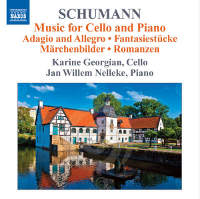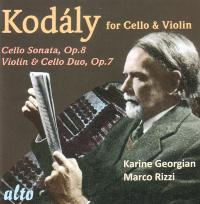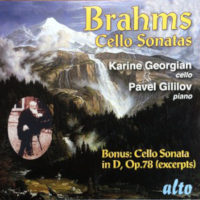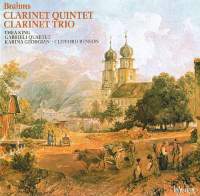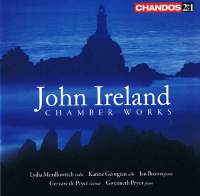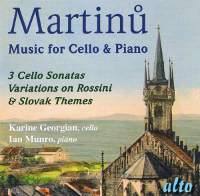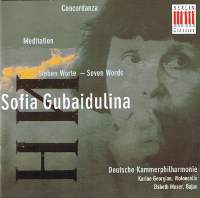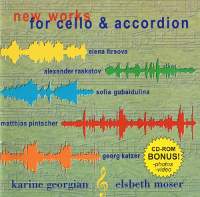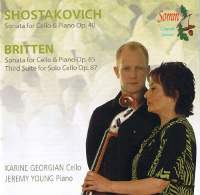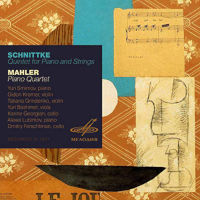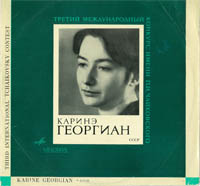Karine Georgian • cellist
|
|
Vaughan Williams Piano Quintet
Naxos 8.573191
London Soloists Ensemble:
Lorraine McAslan (violin)
Sarah-Jane Bradley (viola) Karine Georgian (cello) John Lenehan (piano) Chris West (double bass) Tim Jackson (horn) Ralph Vaughan Williams
Piano Quintet
Quintet in D major
Six Studies in English Folk Song
Romance for Viola and Piano
Robert & Clara Schumann Music for Cello and Piano
Naxos 8.572375
Karine Georgian (cello)
Jan Willem Nelleke (piano) Robert Schumann
Adagio and Allegro, Op 70
Fantasy Pieces, Op 73
Violin Sonata in A minor, Op 105 (arr J W Nelleke)
Fairytale Pictures, Op 115 (arr Robert Haussmann)
Three Romances, Op 94
Clara Schumann
Three Romances, Op 22 (arr J W Nelleke)
The fingerprints of Robert Schumann’s love for the cello are
all over much of his chamber music: the piano quintet and
quartet, the three string quartets, the three piano trios,
not to mention the spellbinding Cello Concerto. So it is odd
that, apart from the Concerto, only twice did he compose
music specifically designated for the solo instrument, of
which only one work, the Five Pieces in Popular Style, has
come down to us. Jan Willem Nelleke and I decided to put
together our own selection of pieces that — even if he did
not say so on the title page — spoke to us of Schumann’s
understanding of the instrument’s unique double ability to
provide a rich substrate in the texture and to soar in
lyrical melody. To it, as a companion piece to Robert’s
Three Romances for oboe, we added
Clara’s Three Romances for
violin. We hope they will both forgive us for our temerity,
because our love and admiration could not be more sincere.
Muso Magazine
Georgian’s peanut butter-smooth tone is a perfect counterpoint for Nelleke’s rolling-agitated piano as they explore Robert’s Romanzen Op 94 and Clara’s Romanzen Op 22. (Incidentally this is the first time Clara’s romances have been set to record using the cello.) After all, what do you expect, from top-notch musicians performing well-rehearsed highlights from the canon, other than fearless, flawless playing? Bach Suites and Gamba Sonatas
SommCD 090-2 (3 CDs)
Karine Georgian (cello)
Gary Cooper (harpsichord) J S Bach
Six Suites for Solo Cello, BWV 1007–1012
Three Sonatas for Viola da Gamba and harpsichord, BWV 1027–1029
CD availability:
Somm Recordings;
Amazon;
Like most cellists I have studied and thought about Bach’s
solo cello suites all my playing life. And like all cellists
I find the more I play them, the more there remains in them
to discover. As one of my heroes, E. T. A. Hoffmann, wrote
almost two hundred years ago: ‘There are moments — above all
when I have been reading in the works of the great Sebastian
Bach — in which the numerical relations, one could say the
mystical rules of counterpoint, awake in me an inner
terror.’ I made this recording in 2007/2008, intending it to
be the summation of my ideas about these incredible works,
but am already finding when I perform them now that there
are subtle differences in my approach to some of the
movements. The recording of the gamba sonatas is Gary
Cooper’s and my second attempt to get the measure of these
intricate, endlessly interesting works; our second shot was
greatly helped by the near-ideal acoustic and atmosphere of
St. Martin’s Church in East Woodhay.
The Herald
I loved her playing: it was deep, rich and soulful, as the best cello playing should be... well here she is on the SOMM label, as strongly flavoured and super-confident as ever, and ploughing a wonderfully fertile furrow of expression in the six suites. Kodály Music for Cello and Violin
Alto ALC 1138
Karine Georgian (cello)
Marco Rizzi (violin) Kodály
Duo for Cello and Violin, Op. 7
Capriccio for Solo Cello
Sonata for Solo Cello, Op. 8
CD availability:
Presto Classical,
Amazon.
Kodály’s writing for cello and for violin represents
some of the most original and ground-breaking new virtuoso
techniques — trills, harmonics, glissandi, tremolos,
left-hand pizzicati — ever to have been asked of string
players. Incorporated as they are into a fusion of
folk-derived tunes with transformatory sonata form and the
inescapable sense of foreboding dominating Europe during the
first World War, they result in passionate, melodically
irresistible music that seems to embody the essence of
Hungary’s soul, its attachment to her land and her people.
Cellist Karine Georgian provides listeners with a deeply satisfying reading of this powerful composition. Her technique is effortless and precise, allowing listeners to focus on the sonata’s many musical highlights rather on its virtuosic demands. From the stratospheric highs to extended bass range of its scordatura tuning, Georgian’s instrument produces an even, powerful, penetrating sound that demands and maintains attention. Brahms Cello Sonatas
Alto ALC 1352
Karine Georgian (cello)
Pavel Gililov (piano) Brahms
Cello Sonata No. 1 in E minor, Op 38
Cello Sonata No. 2 in F, Op 99
Cello Sonata in D, Op 78 (arr Klengel)
CD availability:
Amazon
Some people still raise an eyebrow at the version of
Brahms’s first violin sonata for cello, a fourth below the
original key of G major. But the arrangement was so
skilfully done, with a myriad of tiny alterations lovingly
preserving the balance and relationship between the two
instruments, that for a long time it was assumed Brahms must
have done it himself. But no, it was the work of the
conductor and composer Paul Klengel, a friend of Brahms, and
greatly though I love the two ‘original’ sonatas in E minor
and F major, I think the D major, with its restrained
sweetness of yearning intimacy, is actually my favourite of
all.
Gramophone
Neither Karine Georgian, a pupil of Rostropovich and first prize-winner at the 1966 Tchaikovsky Competition, nor Pavel Gililov had come my way before on disc. But I hope such persuasive musicians will soon do so again. Their sympathy for Brahms equally as susceptible romantic and classical craftsman, struck me as of the unforced, intuitively perceptive kind. Brahms Clarinet Trio
Hyperion CDA66107
Thea King (clarinet)
Karine Georgian (cello) Clifford Benson (piano) Brahms Clarinet Trio in A minor, Op 114)
CD includes also Brahms Clarinet Quintet, Op 115 (Thea King with Gabrieli String Quartet)
CD availability:
Amazon;
Brahms’s Clarinet Trio is one of the master’s more elusive
works, full of a kind of buried unease only partly concealed
by its wealth of broad, peacefully flowing melodies. I am
especially pleased that this recording is still in the
catalogue and thus recalls to mind the special pleasure and
instinctive musicianship I experienced collaborating with
those great artists Thea King and Clifford Benson, both alas
no longer with us.
John Ireland Chamber Works
Chandos CHAN 241–40 (2 CDs)
Lydia Mordkovitch (violin)
Karine Georgian (cello) Ian Brown (piano) John Ireland
Cello Sonata in G minor
The Holy Boy
Phantasie Trio in A minor
Trio No. 2
Trio No. 3
CD includes also Violin Sonatas Nos. 1 & 2 and Fantasy Sonata for Clarinet and Piano
CD availability:
Amazon;
The music of the quintessentially English composer John
Ireland was new to me when I came to Britain in the early
1980s, but as the years went by I came more and more to
appreciate its qualities of sensitivity and solacing
introspection allied to Ireland’s distinctive harmonic
language and the sheer craftsmanship of the writing. The
Cello Sonata in particular has often found its welcome way
into my recital programmes.
Gramophone
The second disc opens with a compelling performance from Karine Georgian and Ian Brown of the fine Cello Sonata of 1923. These admirable artists capture well this music’s wistful, brooding atmosphere and are especially sensitive in the slow movement, a haunting evocation inspired by the landscape of the composer’s beloved Sussex Downs. Martinu Music for Cello and Piano
Alto ALC 1057
Karine Georgian (cello)
Ian Munro (piano) Martinu
Sonata No. 1
Sonata No. 2
Sonata No. 3
Variations on a Slovak Folk Song
Variations on a Theme of Rossini
CD availability:
Amazon;
Nadia Boulanger once wrote that ‘one could not become close
to Martinu without loving him, so radiant was the purity of
his personality. This personality illumines all of his
music.’ Amen to that: Martinu’s sensitivity is at times so
raw one almost feels one can touch it. This music is alive,
it seems to jump off the page, and that is the feeling that
Ian Munro and I tried to convey in our performances and
recordings of it.
MusicWeb International
Gripping recordings of Martinu’s complete
works for cello and piano from the immensely
gifted Russian cellist Karine Georgian.
Sofia Gubaidulina Seven Words
Berlin Classics 0011132BC
Karine Georgian (cello)
Elsbeth Moser (bayan) Deutsche Kammerphilharmonie under the direction of Thomas Klug
CD includes also Gubaidulina’s Concordanza for
chamber ensemble and Meditation über einen Bach-Choral
for harpsichord and string quartet
CD availability: Amazon
New Works for Cello and Accordion
Cordaria CAGD 512 (2 CDs)
Karine Georgian (cello)
Elsbeth Moser (accordion) Elena Firsova Crucifixion
Alexander Raskatov Xcos
Sofia Gubaidulina In croce
Matthias Pintscher Dernier espace avec introspecteur
Georg Katzer Versuchte Annäherung
CD availability: This recording is not commercially available.
Click on one of these pieces to listen:
Elena Firsova: Crucifixion
Alexander Raskatov: Xcos
Sofia Gubaidulina: In croce
Matthias Pintscher: Dernier espace avec introspecteur
Georg Katzer: Versuchte Annäherung
These files are also available in “flac” format, which is higher quality but takes longer to download.
Click here to access the “flac” versions.
Sparked off by the musicianship and virtuosity of the great
Russian bayan (button accordion) player Friedrich Lips,
Sofia Gubaidulina produced seminal works for the instrument,
in two of which (Seven Words
and In Croce) she conceived an
extraordinary partnership with the cello. Gubaidulina’s
music is imbued with an intense spirituality, and so
powerful did her idea prove to be that many composers both
Russian and Western European have since written for the
combination. This recording surveys some of the most
striking examples.
Sonatas by Shostakovich and Britten
SommCD 067
Karine Georgian (cello)
Jeremy Young (piano) Shostakovich Sonata for Cello and Piano, Op 40
Britten Sonata for Cello and Piano, Op 65
Britten Suite No. 3 Op.87 for Solo Cello
CD availability:
Somm Recordings;
Amazon;
The three works on this CD reflect my years of study with
Mstislav Rostropovich in the famous Class 19 of the Moscow
Conservatoire, when we worked together on them. Although
Shostakovich did not write the Sonata for Rostropovich (it
was composed before the composer met the cellist, many years
before the two miraculous concertos he dedicated to him) it
received a complete new lease of life as soon as they got
together to perform it, and it was for ever afterwards
associated with Rostropovich (having recorded it with the
composer at the piano he declined ever to record it with
another pianist). The vein of inspiration that my teacher’s
playing unlocked in Benjamin Britten can be compared with
such influences as that of Richard Mühlfeld and Joachim on
Brahms, Clara Wieck on Schumann, Pierre Bernac on Poulenc —
mainsprings for a canon of works that continue to be at the
core of the repertoire.
The Observer
The insights Karine Georgian brings to these works, along with her innate refinement and technical expertise, make these unusually distinguished performances. Schnittke: Quintet for Piano and Strings
Melodiya, B00PMYHV88 (ASIN)
Yuri Smirnov (piano)
Gidon Kremer (violin) Tatiana Grindenko (violin) Yuri Bashmet (viola) Karine Georgian (cello) Schnittke Quintet for Piano and Strings
Mahler Piano Quartet
CD availability:
Amazon
Locatelli-Piatti Cello Sonata in D
Karine Georgian (cello)
Aza Amintaeva (piano) This rather beautiful three-movement hybrid of eighteenth century Italian baroque violin music and late nineteenth century Romantic cello writing has its origin in two of Locatelli’s set of twelve virtuoso violin sonatas Op. 6, written somewhere in the 1720s but first published in Amsterdam in 1737. Locatelli designed them as showcases for his own stupendous technique, causing one of his patrons in Mantua, Count Benvenuto di San Rafaele, to declare that they all contained ‘rocks famed for their thousand shipwrecks, for the purpose of uniting everything that could discredit the unwary performer.’ While violinists still take their life in their hands when they play these pieces, the great cellist Alfredo Piatti’s efforts to test players on his instrument to destruction are hardly less dangerous. I was delighted to discover recently that I still possess a good vinyl copy of a recording I made for Melodiya in the 1960s with the excellent pianist in Rostropovich’s Moscow Conservatoire class, Aza Amintaeva, and although the sound is not up to a present-day CD release I thought listeners might still like to hear the result. For his transcription Piatti made a sandwich of two movements (the opening Allegro and the final Menuetto with Variations) from Locatelli’s Sonata in D major, Op. 6 No. 6, with the filling consisting of the Adagio from the Sonata in D minor, Op. 6 No. 12. K. G.
CD availability: This recording is not commercially available, but you can listen to it here.
This is also available in the high-quality audio “flac” format.
It is worth the little time it will take to download (it is 70MB).
To listen,
click here.
|


